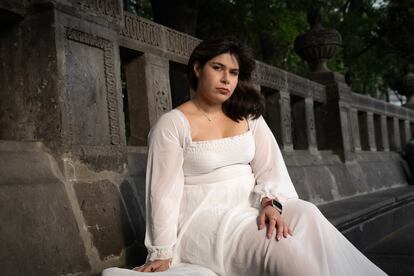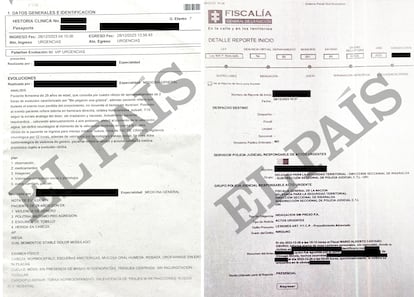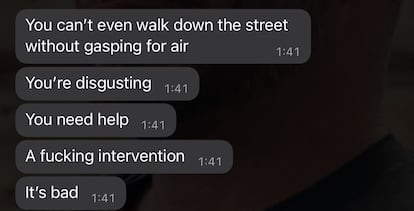A cry for help from a Mexican who survived an attempted femicide in Colombia: ‘I fear for my life’
Valeria Casillas faces a bureaucratic labyrinth in both countries, while her attacker, a U.S. citizen, remains at large and continues to harass her

Valeria Casillas refuses to live in fear. She does not want the violence she endured, which almost killed her, to define her. Still bruised, physically and emotionally scarred, she emphasizes that other women are at risk. She seeks justice, not personal revenge, she stresses. In December she traveled from her native Mexico to Colombia to spend her vacation with the man with whom she had been in a long-distance relationship for three months. Jonathan Lynn Wright is a 39-year-old U.S. citizen living in Pereira, a city located 300 kilometers (186 miles) west of Bogotá. Two days after landing, the romance turned into a nightmare.
Casillas says Wright’s abuse began with possessive comments that escalated into fat-phobic attacks. Verbal violence was followed by anger and, later, a beating. “He punched me several times against the wall, in the face, until he punched me so hard that he knocked me to the floor,” the 29-year-old recounts. Once on the ground, Casillas recalls being kicked in the back. “At one point I thought that if I took one more punch, I was going to die,” says Valeria, still affected. Her assailant checked if she was still breathing, the victim says. When he saw that she was still alive, he told her to leave. “Get the hell out of my house. You’re fat, you disgust me,” he yelled at her as he threw her things out the door.
With a bloodied face, disoriented and without her passport, Casillas says she was left in the street. Passersby called the police’s purple patrol (a unit specialized in dealing with cases of gender violence) and they took her to the Los Rosales Clinic. EL PAÍS has had access to her medical records, which state that Valeria was admitted with polytrauma, a sprained ankle and a head wound, which required five stitches. From her hospital bed, the photographer asked for help from her family in Mexico. Her mother alerted the Mexican consulate in Bogotá, which contacted Valeria by phone. “I was in a state of anxiety, paranoia, fear, frustration...” she recalls.

Before leaving — she still does not know with what strength — Valeria reported Wright to the Prosecutor’s Office. The police managed to recover her passport from her aggressor and she flew home on December 29 with a ticket bought for her by her mother. She returned home battered, but convinced that she had escaped death. An opportunity that 403 women in Colombia and 827 in Mexico, all victims of femicide in 2023, did not have.
Wright’s harassment continued after the assault. Casillas explains that she continued to receive cell phone messages and veiled threats. “He would write me telling me that I deserved it because I was fat. That he loved me and that he had given me a chance, but that he couldn’t deal with my current physical state.”
Valeria’s case is proof that male violence does not understand borders or nationalities. Only one in 10 women in Mexico and Colombia dares to file a complaint, and more than 90% of these cases go unpunished. Victims know that reporting a crime is a tortuous path that can take months, even years. On many occasions, these women not only have to face their abusers, but also the authorities and a justice system that punishes and violates them.
Although Casillas filed a complaint for attempted femicide, the Prosecutor’s Office classified the case as domestic violence, a crime that carries much lower penalties. In addition, the Colombian justice system required her to return to attend the hearings in person. For three weeks, with no news of her case, she asked for help from Mexico’s Secretary of Foreign Affairs, Alicia Bárcena.
Through social networks, Bárcena saw images of a woman with a face covered in blows, asking for her help. “I am desperate. I was the victim of an attempted femicide while visiting Colombia by an American resident in that country. Please help,” Casillas wrote on the social network X. Her message was seen by more than two million people. The foreign minister asked the director general of Consular Protection to attend to her case and reiterated her willingness to support her. After an interview on Mexican television, the authorities began to follow up on the case. “That day I began to feel the support of the authorities. The embassy is in communication with me and the ones I am struggling a bit with are the authorities in Colombia,” she says. This newspaper contacted the Ministry of Foreign Affairs, but did not receive a response to its request.

Without having clear and precise information on the progress of her complaint in Colombia, when the arraignment hearing was announced, Casillas requested that it be held virtually. Just 48 hours beforehand, she met the public defender assigned to her and did not have time to speak with him before the hearing. Casillas claims that, as such, her attorney did not know the details of the case. This newspaper contacted the lawyer in question, who refrained from providing information and referred the matter to the Prosecutor’s Office. The latter does not have effective channels to provide more information on the progress of the complaint.
As scheduled, the hearing was held last Friday, January 19. Although Wright’s activity on social networks indicates that he is still in Pereira, he did not show up, claiming that he was out of town.
Under Law 1257 of 2008, in Colombia no magistrate can force a woman to confront her aggressor against her will. “It is a right that has been reiterated by the Constitutional Court in several rulings, and implies that we must adopt tools that the justice system already has in place to guarantee the continuity of the judicial process, of the investigation, and an eventual punishment,” Adriana Alquichides, a lawyer and expert in gender-based violence, tells EL PAÍS.
Wright was not arrested after the assault, despite the evidence against him and the continued harassment of the victim. Casillas states it is not the first time that her aggressor has been denounced for violence against women. Wright was convicted in 2009 for possession of cocaine and served a sentence in Illinois, according to official documents to which this newspaper has had access. After that he lived in Mexico for 10 years and then moved to Colombia.
As seen by his posts on platforms such as Facebook or WhatsApp, Wright continues with his life. Just a few hours after the assault, he posted photos. He has not been arrested nor has he provided a statement. “I fear for my life, that’s why I don’t want to go back to Colombia. Besides, he also has a Mexican residency permit and I am afraid there will be repercussions,” Casillas says.
Desperate to prevent her attacker from fleeing, Casillas turned to the U.S. Embassy for help. The U.S. authorities referred her to the Colombian police, arguing that they could do nothing against one of their citizens overseas. “What he did to me, he could do to more women,” she says.
After the hearing on January 19, Casillas’ lawyer managed to reclassify the investigation into the crime as attempted femicide due to the brutality of the assault and thanks to the evidence provided by the victim. A month has passed since the photographer experienced what she considers one of the most painful episodes of her life. Meanwhile, her assailant remains at large.
Sign up for our weekly newsletter to get more English-language news coverage from EL PAÍS USA Edition
Tu suscripción se está usando en otro dispositivo
¿Quieres añadir otro usuario a tu suscripción?
Si continúas leyendo en este dispositivo, no se podrá leer en el otro.
FlechaTu suscripción se está usando en otro dispositivo y solo puedes acceder a EL PAÍS desde un dispositivo a la vez.
Si quieres compartir tu cuenta, cambia tu suscripción a la modalidad Premium, así podrás añadir otro usuario. Cada uno accederá con su propia cuenta de email, lo que os permitirá personalizar vuestra experiencia en EL PAÍS.
¿Tienes una suscripción de empresa? Accede aquí para contratar más cuentas.
En el caso de no saber quién está usando tu cuenta, te recomendamos cambiar tu contraseña aquí.
Si decides continuar compartiendo tu cuenta, este mensaje se mostrará en tu dispositivo y en el de la otra persona que está usando tu cuenta de forma indefinida, afectando a tu experiencia de lectura. Puedes consultar aquí los términos y condiciones de la suscripción digital.








































